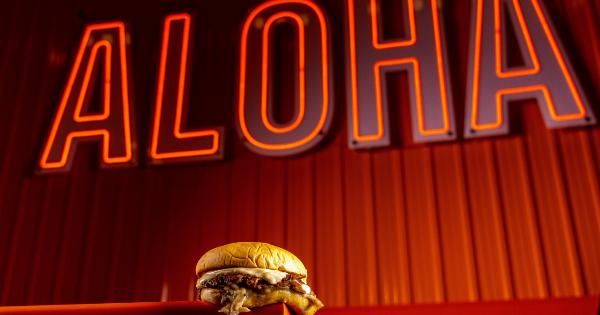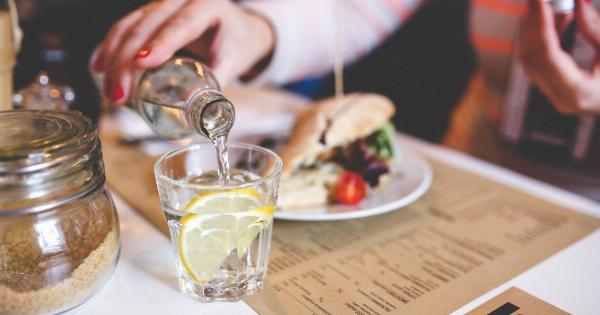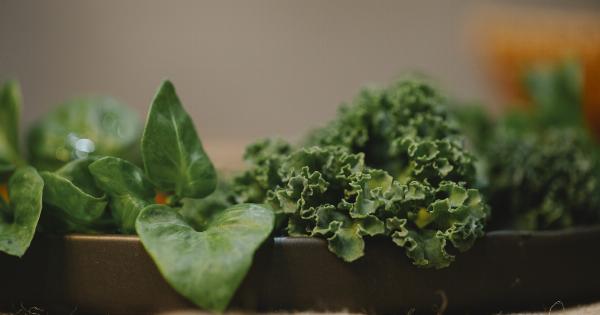Drinking water is essential for our overall health and well-being. It is a natural and calorie-free beverage that keeps our body hydrated and aids in various bodily functions.
While it is commonly advised to drink water throughout the day, there has been some debate regarding the appropriate time to consume water, especially in relation to meal times. Some people believe that drinking water while eating can have negative effects on digestion, while others argue that it is perfectly fine.
In this article, we will explore the different perspectives and scientific evidence to determine whether it is good to drink water while eating.
The Importance of Water
Before delving into the discussion, it is essential to understand the vital role water plays in our bodies. Water is the main component of our cells, tissues, and organs.
It helps regulate body temperature, lubricates joints, aids in digestion, transports nutrients, and flushes waste from the body. Without an adequate intake of water, our bodies cannot function optimally, and we may experience symptoms of dehydration such as fatigue, dry mouth, and dizziness.
The Argument Against Drinking Water While Eating
Some proponents of the belief that drinking water while eating is not advisable argue that it can dilute stomach acid, impairing the digestion process.
Stomach acid is crucial for breaking down the food we consume into smaller particles that can be absorbed and utilized by the body. Drinking water during meals, they claim, can dilute the stomach acid, making it less effective in breaking down food properly. This may lead to indigestion, bloating, and nutrient malabsorption.
Additionally, it is believed that drinking water with meals can negatively affect the production of digestive enzymes. These enzymes help break down macronutrients like proteins, carbohydrates, and fats into smaller molecules that our bodies can absorb.
By diluting the digestive enzymes, water consumption during meals may hinder their ability to efficiently break down the nutrients in the food we eat.
Understanding the Digestive Process
Before assessing the claims made against drinking water while eating, it is important to understand the process of digestion. Digestion begins in the mouth, where food is physically broken down by chewing and mixed with saliva.
The food then travels down the esophagus and enters the stomach, where it is further broken down by stomach acid and digestive enzymes. From the stomach, the partially digested food moves into the small intestine, where nutrients are absorbed into the bloodstream. Finally, the remaining waste is passed through the large intestine and excreted from the body.
The Counterarguments
While some believe that drinking water during meals can disrupt the digestive process, there is limited scientific evidence to support this claim.
In fact, several studies have found no significant negative effects of drinking water while eating on digestion.
One study published in the World Journal of Gastroenterology found that water consumption during a meal had no impact on the rate of gastric emptying or the release of digestive enzymes.
The research concluded that drinking water while eating does not inhibit digestion or impair the absorption of nutrients from the food consumed.
Another study published in the Journal of Gastroenterology and Hepatology evaluated the effects of water consumption on postprandial (after-meal) gastrointestinal function.
The results showed that drinking water with a meal did not affect the absorption of nutrients, gastric emptying, or intestinal transit time. These findings further support the notion that water consumption during meals does not disrupt the digestive process.
Benefits of Drinking Water While Eating
Contrary to the argument against drinking water while eating, some experts and researchers believe that it can have several benefits.
Firstly, drinking water with meals can help soften food, making it easier to chew and swallow.
This can be particularly beneficial for individuals who have difficulty swallowing or have conditions that affect their ability to consume solid foods comfortably.
Secondly, water can help create a feeling of fullness, potentially leading to a decrease in food consumption.
By filling the stomach, water can help control portion sizes and prevent overeating, which is beneficial for weight management and overall health.
Lastly, staying hydrated by drinking water throughout the day, including during meals, is essential for optimal bodily functions. Water helps transport nutrients, remove waste products, and maintain proper bodily functions.
By incorporating water consumption during meals, individuals can ensure they are meeting their daily hydration needs.
Conclusion
The debate surrounding whether it is good to drink water while eating has garnered differing opinions.
While some argue that it can hinder digestion by diluting stomach acid and digestive enzymes, scientific evidence suggests that drinking water during meals has no significant negative effects on digestion or nutrient absorption.
In fact, drinking water with meals can have various benefits, such as aiding in food softening and facilitating swallowing, promoting a feeling of fullness, and maintaining hydration levels throughout the day.
Ultimately, whether to drink water while eating is a personal choice that may vary depending on individual preferences and digestive health.
However, for most individuals, incorporating water consumption during meals is unlikely to have detrimental effects on digestion and can contribute to overall hydration and well-being.






























